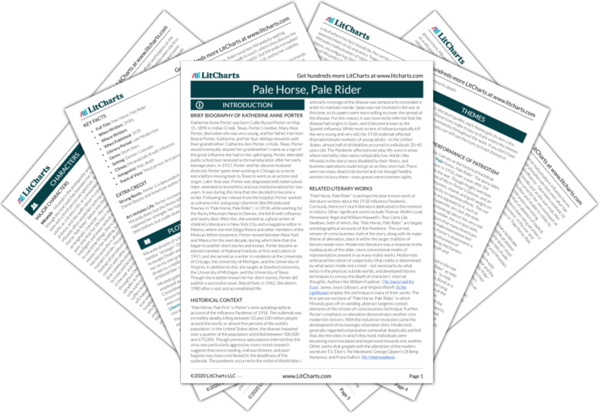Paleness, or grayness, symbolizes death in the story. The Pale Horse in the story’s title is a reference to one of the Four Horsemen of the Apocalypse described in the Book of Revelation in the New Testament, in which the pale horse also symbolizes death. The pale horse appears twice in Miranda’s initial dream: in the horse, Graylie, that Miranda decides to take on her journey to “outrun Death and the Devil,” and in the horse of the familiar stranger who rides alongside Miranda. In the biblical interpretation of this myth, the Four Horsemen (four riders on white, red, black, and pale horses) symbolize pestilence, war, famine, and death—four ills that would ravage humanity in the final days of life on Earth. When Miranda sees a pale horse in her dream in the beginning of the story, thus, the reader may assume that she has death on her mind. The same symbolic association exists when Miranda describes certain objects or ideas as pale, gray, or ashen in color. For example, when Miranda dreams “oblivion” in her final hallucination, she sees “a whirlpool of gray water turning upon itself for all eternity.” As gray is typically associated with paleness and a lack of vitality or blood, thereby connoting death, Porter’s choice to describe the water as gray saturates the image in lifelessness. In contrast, Miranda describes Adam as “all olive and tan and tawny, hay colored and sand colored from hair to boots.” Each of these tones evokes warmth and saturation of color—the opposite of paleness. In this notable absence of paleness, Porter demonstrates Miranda’s tendency to avoid thinking about Adam’s mortality.
Paleness Quotes in Pale Horse, Pale Rider
The stranger swung into his saddle beside her, leaned far towards her and regarded her without meaning, the blank still stare of mindless malice that makes no threats and can bide its time.

Unlock explanations and citation info for this and every other Pale Horse, Pale Rider quote.
Plus so much more...
Get LitCharts A+“Death always leaves one singer to mourn.”
Granite walls, whirlpools, stars are things. None of them is death, nor the image of it. Death is death, said Miranda, and for the dead it has no attributes.
There was no light, there must never be light again, compared as it must always be with the light she had seen beside the blue sea that lay so tranquilly along the shore of her paradise.












